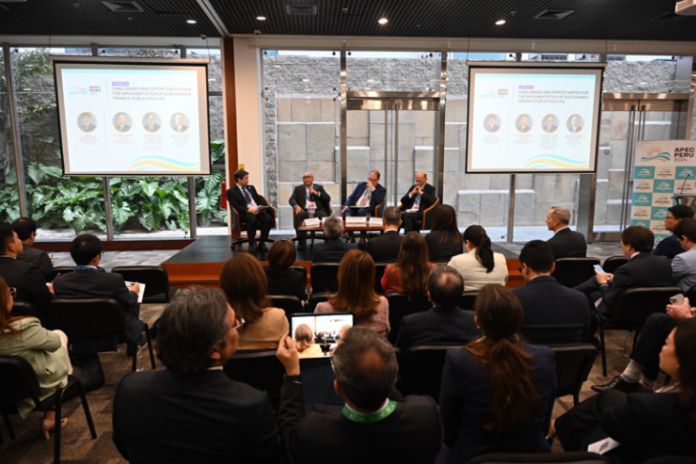By the APEC Finance Ministers’ Process
LIMA, Peru – The growing urgency to address climate change and environmental challenges has propelled sustainable finance into the spotlight as governments, businesses and investors increasingly prioritize sustainability considerations. This shift is transforming the financial landscape and driving capital toward projects that promote sustainability from renewable energy infrastructure to social impact initiatives.
Against this backdrop, APEC Finance Ministers from across the APEC region convened in Lima on Sunday to discuss strategies for promoting low-carbon, climate-resilient economies. Representatives from international organizations, business leaders, and experts also offered their views on transition to a sustainable economy and the potential for investment it may bring.
Opening the high-level event on Sustainable Finance: Public Policies in Action for Sustainable Development, José Arista Arbildo, Peru’s minister of economy and finance, emphasized the importance of recognizing the interconnection between economic growth, environmental sustainability and social well-being.
“We are facing unprecedented global environmental challenges such as climate change, biodiversity loss and natural resource scarcity,” minister Arista said. “These challenges not only pose a threat to the environment, but also have significant implications for economic stability and the well-being of the populations of our economies.”
Sustainable finance, a broad term that refers to investments aimed at generating both financial returns and positive environmental or social outcomes, has seen unprecedented growth. With the global economy increasingly focused on mitigating climate risks and achieving long-term sustainable development, financial institutions are responding by integrating sustainability criteria into their portfolios.
“The strengthening of economic and financial systems is necessary to ensure their efficient adaptation to new paradigms that will make it possible to promote environmental, social and economic sustainability,” he added. “In this context, public policies are a transformative tool for integrating sustainability into the financial framework of our economies.”
To successfully embed sustainability into the financial system, economies must embrace a strategic vision that shapes public policies promoting environmentally responsible practices.
“Strategic planning for this integration is not only an ethical imperative, but also an economic necessity,” minister Arista explained. “Providing a predictable framework for sustainable finance is one such policy.”
During the panel discussion, experts called for holistic strategies that harmonize economic and financial activities to foster competitiveness and productivity. They stressed the importance of setting clear, long-term sustainability goals including the importance of governance frameworks and spaces for coordination; and fostering collaboration among stakeholders.
The conversation also tackled the practical challenges member economies face in implementing sustainable financial practices. It further underscored the critical role of public-private partnerships in overcoming obstacles such as limited funding and regulatory barriers.
APEC Business Advisory Council chair, Julia Torreblanca, echoed the sentiment, highlighting the importance of business and public sector collaboration in driving sustainable development.
“Sustainable finance is a joint endeavour where the private sector plays a critical role,” Torreblanca said. “However, it needs a policy environment that fosters innovation, facilitates sustainable investments and nurtures public-private collaboration.”
According to experts, the transition to a sustainable economy presents significant investment opportunities despite the challenges. From renewable energy projects to sustainable agriculture, sectors aimed at reducing carbon emissions and promoting social equity are poised for growth. Experts also explored the potential for innovative economic instruments to support sustainability initiatives.
One key takeaway from the event was the importance of fostering partnerships between governments, businesses and financial institutions. Such collaborations are seen as essential for creating innovative financial instruments and policies that will enhance the implementation of sustainable finance initiatives across the APEC region.
“Being appropriately prepared to address emerging challenges and seize opportunities along the path to sustainable finance is essential,” minister Arista concluded. “Public policies are thus a powerful tool that can guide us. If designed and implemented correctly, they can transform our economies and societies.”





